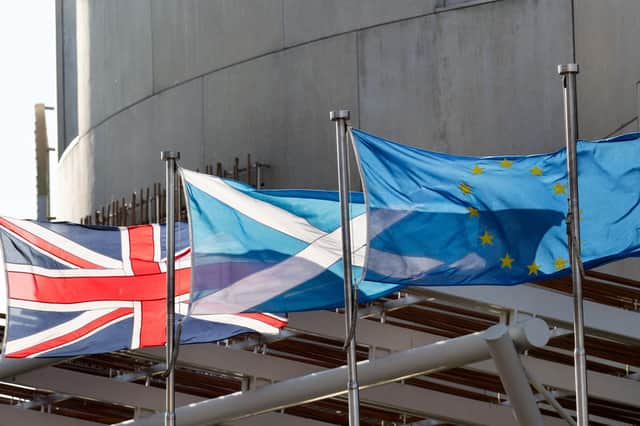Let’s avert constitutional bust-up over the Internal Market Bill – Malcolm Bruce


Attention has been focussed on Section 5 of the Bill which would give the government Parliamentary authority to break international law.
This probably suits Dominic Cummings and his aide Boris Johnson as it distracts attention, as it was probably meant to do, from the rest of the bill which, if unamended would drive a coach and horses over the devolution settlements that have been developed over more than 20 years and have far reaching implications for the future of the United Kingdom.
Advertisement
Hide AdAdvertisement
Hide AdAs it stands, many powers being returned from the EU to the UK will revert to the devolved legislatures. The mischief is that the powers in the Internal Market Bill enables UK ministers to make decisions that could override or negate the actions and laws of the devolved administrations.
Liberal Democrats in the House of Lords are seeking to amend the bill to allow a consensus to be achieved and the threat of a constitutional crisis and added uncertainty for business to be set aside.
The Government has failed to persuade a wide range of critics and commentators of the need for this legislation at all and, to the extent that some legal changes may be necessary, why such a hurry so late in the Brexit process? More than one parliamentary committee has questioned the need for the bill which appears to be a solution looking for a problem.
What is even more confusing is that a process to establish a common approach across the UK to the return of powers from the EU was agreed and set in motion three years ago by the Joint Ministerial Committee on EU Negotiations. This set out principles behind common frameworks covering 160 separate policy areas of which only 40 needed to be active and only 15 might require primary legislation.
These have been progressing constructively. The first ones are nearing conclusion and it is thought most will be resolved nearly next year.
This process has the support and engagement of all the four administrations. It is based on negotiation and prioritising agreement and consent and, although there is a dispute mechanism it has not yet been required.
The Internal Market Bill empowers UK Government Ministers to take decisions on divergence which would overrule or set aside the decisions of the devolved parliaments.
When pressed to explain why this is necessary UK Ministers come up with bizarre or ill-informed arguments. Based on no evidence it has been suggested that Scotch whisky distillers may be prevented from buying malting barley from English producers.
Advertisement
Hide AdAdvertisement
Hide AdThe potential for differential building standards has been raised in apparent ignorance of the fact that there have been discrete Scottish building standards that predate devolution and no problems have arisen.
As the bill stands, without significant amendment, both the Welsh and Scottish Parliaments are likely to withhold their consent and the Northern Ireland Assembly may do the same. This would precipitate a full-blown constitutional crisis in the run-up to key elections in Scotland and Wales.
To avoid this added uncertainty for Scottish business and, indeed businesses across the UK, the Liberal Democrats are promoting a significant amendment to the bill in the House of Lords.
The thrust of the amendment would be to suspend implementation of the bill until agreement is reached on the operation of the internal market framework and robust dispute mechanisms are established.
Exclusions from the market access principles should be agreed and oversight councils should include representatives from all four nations.
The question the Government is unable to provide a convincing answer to is why the eminently sensible and constructive principles of the Common Frameworks are being set aside by the UK Internal Market Bill?
Specifically, the communique setting out the Common Frameworks described the objective as enabling the function of the UK Internal Market while acknowledging policy divergence. It further stated the devolution settlement should be respected and be based on the established conventions and practices, including that the competence of the devolved institutions will not normally be adjusted without their consent.
As a party with the deepest commitment of any to Home Rule, Liberal Democrats are determined to protect the devolution settlement against a centralising government in London and the separatist thrust of the SNP.
Advertisement
Hide AdAdvertisement
Hide AdScotland’s best interests lie in using the powers that have been secured and ensuring they are not eroded.
Part 6 of the Bill also gives the UK Government powers to spend money and promote policies within the devolved areas without their being consulted or involved.
My local MP commenting on the Bill said “The UK Government is back in Scotland. Get used to it”. This is extraordinary given the massive spending on furlough schemes and business loans in Scotland funded directly by the UK Government.
As we rebuild after a botched Brexit and a mishandled Covid19 crisis businesses does not need further disruption over constitutional arguments. With the mechanisms in place and goodwill to seek the best for Scotland and respect devolution, confidence can be restored.
Ideally, the Government should abandon this bill which is at best premature and probably unnecessary. But as long as the Government push ahead Liberal Democrats will push to secure this responsible and constructive amendment and save us from an unwanted and unnecessary crisis. Surely, we have had enough disruption for one year – or ten.
Lord Malcolm Bruce, was the Member of Parliament for Gordon from 1983 to 2015. he was made a life peer in 2015
Comments
Want to join the conversation? Please or to comment on this article.